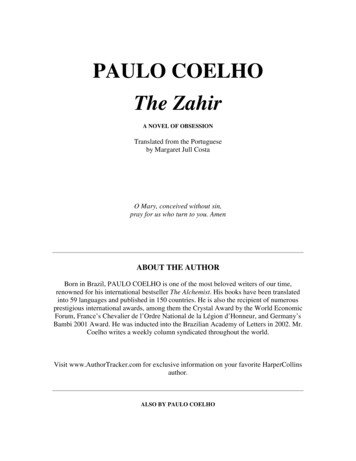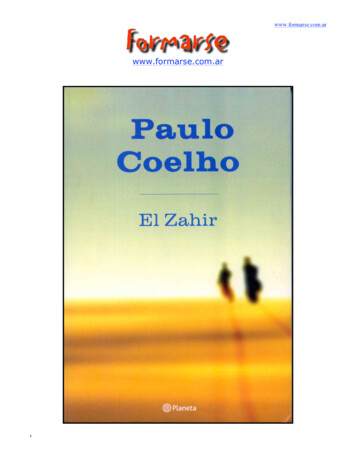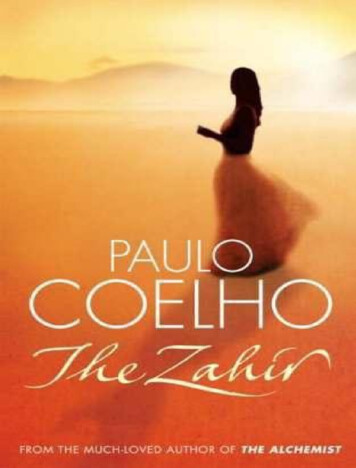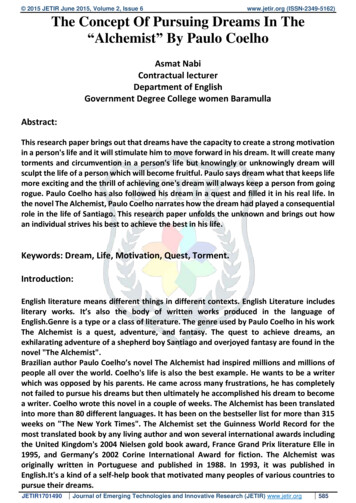
Transcription
PAULO COELHOThe ZahirA NOVEL OF OBSESSIONTranslated from the Portugueseby Margaret Jull CostaO Mary, conceived without sin,pray for us who turn to you. AmenABOUT THE AUTHORBorn in Brazil, PAULO COELHO is one of the most beloved writers of our time,renowned for his international bestseller The Alchemist. His books have been translatedinto 59 languages and published in 150 countries. He is also the recipient of numerousprestigious international awards, among them the Crystal Award by the World EconomicForum, France’s Chevalier de l’Ordre National de la Légion d’Honneur, and Germany’sBambi 2001 Award. He was inducted into the Brazilian Academy of Letters in 2002. Mr.Coelho writes a weekly column syndicated throughout the world.Visit www.AuthorTracker.com for exclusive information on your favorite HarperCollinsauthor.ALSO BY PAULO COELHO
The AlchemistThe PilgrimageThe ValkyriesBy the River Piedra I Sat Down and WeptThe Fifth MountainVeronika Decides to DieWarrior of the Light: A ManualEleven MinutesCREDITSPhotograph of mountains Romilly Lockyer / Getty ImagesPhotograph of woman SuperstockCopyrightCopyright 2005 by Paulo Coelho. Englishtranslation copyright 2005 Margaret Jull Costa. All rights reserved under Internationaland Pan-American Copyright Conventions. By payment of the required fees, you havebeen granted the non-exclusive, non-transferable right to access and read the text of thise-book on-screen. No part of this text may be reproduced, transmitted, down-loaded,decompiled, reverse engineered, or stored in or introduced into any information storageand retrieval system, in any form or by any means, whether electronic or mechanical,now known or hereinafter invented, without the express written permission ofPerfectBound .THE ZAHIR: A NOVEL OF OBSESSION.A DF Books NERDs ReleasePerfectBound and the PerfectBound logo are trademarks of HarperCollinsPublishers, Inc.Mobipocket Reader August 2005 ISBN 0-06-088376-6
Library of Congress Cataloging-in-Publication DataCoelho, Paulo.[Zahir. English]The Zahir: a novel of obsession / Paulo Coelho ; translated from the Portuguese byMargaret Jull Costa.—Ist US ed.p. cm.ISBN 10: 0-06-082521-9 (hardcover: alk. paper)ISBN 13: 978-0-06-082521-810 9 8 7 6 5 4 3 2 1What man of you, having an hundred sheep, if he lose one of them doth not leave theninety and nine in the wilderness, and go after that which is lost, until he find it?LUKE 15:4ITHACAWhen you set out on your journey to Ithaca,pray that the road is long,full of adventure, full of knowledge.The Lestrygonians and the Cyclops,the angry Poseidon—do not fear them:You will never find such as these on your pathif your thoughts remain lofty, if a fineemotion touches your spirit and your body.The Lestrygonians and the Cyclops,the fierce Poseidon you will never encounter,if you do not carry them within your soul,if your heart does not set them up before you.Pray that the road is long.That the summer mornings are many, when,with such pleasure, with such joy
you will enter ports seen for the first time;stop at Phoenician markets,and purchase fine merchandise,mother-of-pearl and coral, amber and ebony,and sensual perfumes of all kinds,as many sensual perfumes as you can;visit many Egyptian cities,to learn and learn from scholars.Always keep Ithaca in your mind.To arrive there is your ultimate goal.But do not hurry the voyage at all.It is better to let it last for many years;and to anchor at the island when you are old,rich with all you have gained on the way,not expecting that Ithaca will offer you riches.Ithaca has given you the beautiful voyage.Without her you would never have set out on the road.She has nothing more to give you.And if you find her poor, Ithaca has not deceived you.Wise as you have become, with so much experience,you must already have understood what Ithacas mean.CONSTANTINE CAVAFY (1863–1933)translated by Rae DalvenDEDICATIONIn the car, I mentioned that I had finished the first draft of my book. Later, as we set outtogether to climb a mountain in the Pyrenees which we both consider to be sacred andwhere we have already shared some extraordinary moments, I asked if she wanted toknow the main theme of the book or its title; she would love to, she said, but, out ofrespect for my work, she had, until then, asked nothing, she had simply felt glad—veryglad.So I told her the title and the main theme. We continued walking in silence and, on theway back, we heard a noise; the wind was getting up, passing above the leafless trees andcoming down toward us, causing the mountain once more to reveal its magic and itspower.
Suddenly the snow began to fall. I stopped and stood contemplating that moment: thesnowflakes falling, the gray sky, the forest, the woman by my side. The woman who hasalways been by my side.I felt like telling her then, but decided to let her find out when she read these pages for thefirst time. This book is dedicated to you, Christina, my wife.According to the writer Jorge Luis Borges, the idea of the Zahir comes from Islamictradition and is thought to have arisen at some point in the eighteenth century. Zahir, inArabic, means visible, present, incapable of going unnoticed. It is someone or somethingwhich, once we have come into contact with them or it, gradually occupies our everythought, until we can think of nothing else. This can be considered either a state ofholiness or of madness.FAUBOURG SAINT-PÈRESEncyclopaedia of the Fantastic (1953)CONTENTSO Mary What man of you, having an hundred sheep, if he lose ITHACADEDICATIONAccording to the writer Jorge Luis Borges
I AM A FREE MANHANS’S QUESTIONARIADNE’S THREADTHE RETURN TO ITHACAAUTHOR’S NOTEABOUT THE AUTHORALSO BY PAULO COELHOCREDITSCOVERCOPYRIGHTABOUT THE PUBLISHERI AM A FREE MAN
Her name is Esther; she is a war correspondent who has just returned from Iraqbecause of the imminent invasion of that country; she is thirty years old, married, withoutchildren. He is an unidentified male, between twenty-three and twenty-five years old,with dark, Mongolian features. The two were last seen in a café on the Rue du FaubourgSt-Honoré.The police were told that they had met before, although no one knew how often: Estherhad always said that the man—who concealed his true identity behind the nameMikhail—was someone very important, although she had never explained whether hewas important for her career as a journalist or for her as a woman.The police began a formal investigation. Various theories were put forward—kidnapping,blackmail, a kidnapping that had ended in murder—none of which were beyond thebounds of possibility given that, in her search for information, her work brought her intofrequent contact with people who had links with terrorist cells. They discovered that, inthe weeks prior to her disappearance, regular sums of money had been withdrawn fromher bank account: those in charge of the investigation felt that these could have beenpayments made for information. She had taken no change of clothes with her, but, oddlyenough, her passport was nowhere to be found.He is a stranger, very young, with no police record, with no clue as to his identity.She is Esther, thirty years old, the winner of two international prizes for journalism, andmarried.My wife.Iimmediately come under suspicion and am detained because I refuse to say where Iwas on the day she disappeared. However, a prison officer has just opened the door of mycell, saying that I’m a free man.And why am I a free man? Because nowadays, everyone knows everything abouteveryone; you just have to ask and the information is there: where you’ve used yourcredit card, where you spend your time, whom you’ve slept with. In my case, it was eveneasier: a woman, another journalist, a friend of my wife, and divorced—which is why shedoesn’t mind revealing that she slept with me—came forward as a witness in my favorwhen she heard that I had been detained. She provided concrete proof that I was with heron the day and the night of Esther’s disappearance.
“She asks him if he will marry her. He is taken aback; after all, she is young enough to behis granddaughter, and so he says nothing. At sunset, in the small living room, she asks ifshe can stroke his head before he goes to sleep. He enjoys another peaceful night.“The following day, the subject of marriage comes up again, this time in the presence ofher parents, who seem to think it a good idea; they just want their daughter to find ahusband and to cease being a source of family shame. They invent a story about an oldman who has come from far away and who is, in fact, a wealthy trader in carpets, but hasgrown weary of living a life of luxury and comfort, and has given it all up in order to goin search of adventure. People are impressed, they imagine a generous dowry, huge bankaccounts, and think how lucky my mother is to have finally found someone who can takeher away from that village in the back of beyond. My father listens to these stories with amixture of fascination and surprise; he thinks of all the years he has spent alone,traveling, of all he has suffered, of how he never again found his own family, and hethinks that now, for the first time in his life, he could have a home of his own. He acceptsthe proposal, colludes with the lies about his past, and they get married according to theMuslim tradition. Two months later, she is pregnant with me.“I live with my father until I am seven years old; he sleeps well, works in the fields, goeshunting, and talks to the other villagers about his money and his lands; and he looks atmy mother as if she were the only good thing that has ever happened to him. I grow upbelieving that I am the son of a rich man, but one night, by the fire, he tells me about hispast and why he married, but begs me not to tell anyone else. Soon, he says, he will die,and four months later he does. He breathes his last in my mother’s arms, smiling, as if hehad never known a moment’s sadness. He dies a happy man.”Mikhail is telling his story on a very cold spring night, although it is certainly not as coldas in Stalingrad, where temperatures can plummet to -35 C. We are sitting with somebeggars who are warming themselves before an improvised bonfire. I had gone there aftera second phone call from Mikhail, asking me to keep my part of the promise. During ourconversation, he did not once mention the envelope he had left at my apartment, as if heknew—perhaps through the voice—that I had, in the end, decided to follow the signs andallow things to happen in their own time and thus free myself from the power of theZahir.When he asked me to meet him in one of the most dangerous parts of Paris, my firstreaction was one of alarm. Normally, I would have said that I was far too busy and triedto convince him that we would be better off going to some cozy bar where we couldsafely discuss important matters. I was still afraid that he might have another epileptic fitin public, even though I now knew what to do, but that was preferable to the risk of beingmugged when I was wearing an orthopedic collar and had no way of defending myself.Mikhail insisted: I had to meet the beggars; they were part of his life and part of Esther’slife too. I had realized while I was in the hospital that there was something wrong with
my own life and that change was urgently needed. How best to achieve that change? Bydoing something totally different; for example, going to dangerous places and meetingsocial outcasts.There is a story about a Greek hero, Theseus, who goes into a labyrinth in order to slay amonster. His beloved, Ariadne, gives him one end of a thread so that he can unroll it ashe goes and thus be able to find his way out again. Sitting with those people, listening toMikhail’s story, it occurs to me that I have not experienced anything like this for a longtime—the taste of the unknown, of adventure. Who knows, perhaps Ariadne’s thread waswaiting for me in precisely the kind of place that I would never normally visit, or only if Iwas convinced that I had to make an enormous effort to change my story and my life.Mikhail continued his story, and I saw that the whole group was listening to what he wassaying: the most satisfying encounters do not always happen around elegant tables innice, warm restaurants.“Every day, I have to walk nearly an hour to the village where I go to school. I see thewomen going to fetch water, the endless steppes, the Russian soldiers driving past in longconvoys, the snow-capped mountains which, I am told, conceal a vast country: China.The village I walk to each day has a museum dedicated to its one poet, a mosque, aschool, and three or four streets. We are taught about the existence of a dream, an ideal:we must fight for the victory of Communism and for equality among all human beings. Ido not believe in this dream, because even in this wretchedly poor village, there aremarked differences: the Party representatives are above everyone else; now and again,they visit the big city, Almaty, and return bearing packages of exotic food, presents fortheir children, expensive clothes.“One afternoon, on my way home, I feel a strong wind blowing, see lights all around me,and lose consciousness for a few moments. When I come to, I am sitting on the ground,and a very white little girl, wearing a white dress with a blue belt, is floating in the airabove me. She smiles but says nothing, then disappears.“I run home, interrupt my mother’s work, and tell her what I have seen. She is terrifiedand asks me never to repeat what I have just told her. She explains to me—as well as onecan explain such a complicated concept to an eight-year-old boy—that it was just ahallucination. I tell her that I really did see the girl, that I can describe her in every detail.I add that I wasn’t afraid and came home at once because I wanted her to know what hadhappened.“The following day, coming back from school, I look for the girl, but she isn’t there.Nothing happens for a whole week, and I begin to think that perhaps my mother wasright: I must simply have dropped asleep and dreamed it all.
“Then, this time very early one morning, on my way to school, I again see the girlfloating in the air and surrounded by a white halo. I don’t fall to the ground or see anyflashing lights. We stand for a while, looking at each other; she smiles and I smile back; Iask her name, but receive no answer. At school, I ask my classmates if they have everseen a girl floating in the air. They all laugh.“During class, I am summoned to the headmaster’s office. He explains to me that I musthave some mental problem—there is no such thing as ‘visions’; the only reality is whatwe see around us; religion was merely invented to fool the people. I ask about themosque in the city; he says that only the old and superstitious go there, ignorant, idlepeople who lack the necessary energy to rebuild the socialist world. Then he issues athreat: if I repeat the story about the little girl, I will be expelled. Terrified, I beg him notto say anything to my mother, and he agrees, as long as I tell my classmates that I madethe whole thing up.“He keeps his promise and I keep mine. My friends aren’t much interested anyway anddon’t even ask me to show them the place where I saw the girl. However, she continuesto appear to me for the whole of the following month. Sometimes I faint first, sometimesI don’t. We never talk, we simply stay together for as long as she chooses to stay. Mymother is beginning to grow worried because I always arrive home at a different time.One night, she forces me to explain what I do between leaving school and getting home. Iagain tell her about the little girl.“To my surprise, this time, instead of scolding me, she says that she will go to the placewith me. The following day, we wake early and, when we arrive, the girl appears, but mymother cannot see her. My mother tells me to ask the girl something about my father. Idon’t understand the question, but I do as she requests, and then, for the first time, I hearthe voice. The girl does not move her lips, but I know she is talking to me: She says thatmy father is fine and is watching over us, and that he is being rewarded now for all hissufferings on earth. She suggests that I remind my mother about the heater. I do so, andmy mother starts to cry and explains that because of his many hardships during the war,the thing my father most enjoyed was sitting next to a heater. The girl says that the nexttime my mother passes that way she should tie a scrap of fabric and a prayer around thesmall tree growing there.“The visions continue for a whole year. My mother tells some of her closest friends, whotell other friends, and soon the tree is covered in scraps of fabric. Everything is done inthe greatest secrecy; the women ask about loved ones who have died; I listen to thevoice’s answers and pass on the messages. Usually, their loved ones are fine, and on onlytwo occasions does the girl ask the group to go to a nearby hill at sunrise and say awordless prayer for the souls of those people. Apparently, I sometimes go into a trance,fall to the ground, and babble incomprehensibly, but I can never remember anythingabout it. I only know that when I am about to go into a trance, I feel a warm windblowing and see bubbles of light all around me.
“One day, when I am taking a group to meet the little girl, we are prevented from doingso by the police. The women protest and shout, but we cannot get through. I am escortedto school, where the headmaster informs me that I have just been expelled for provokingrebellion and encouraging superstition.“On the way back, I see that the tree has been cut down and the ribbons scattered on theground. I sit down alone and weep, because those had been the happiest days of my life.At that moment, the girl reappears. She tells me not to worry, that this was all part of theplan, even the destruction of the tree, and that she will accompany me now for the rest ofmy days and will always tell me what I must do.”“Did she never tell you her name?” asks one of the beggars.“Never. But it doesn’t matter because I always know when she’s talking to me.”“Could we find out something about our dead?”“No. That only happened during one particular period. Now my mission is different. MayI go on with my story?”“Absolutely,” I say. “But can I just ask one thing? There’s a town in southwest Francecalled Lourdes. A long time ago, a shepherdess saw a little girl, who seems to correspondto your vision.”“No, you’re wrong,” says one of the older beggars, who has an artificial leg. “Theshepherdess, whose name was Bernadette, saw the Virgin Mary.”“I’ve written a book about her visions and I had to study the matter closely,” I say. “Iread everything that was published about it at the end of the nineteenth century; I hadaccess to Bernadette’s many statements to the police, to the church, and to scholars. At nopoint does she say that she saw a woman; she insists it was a girl. She repeated the samestory all her life and was deeply angered by the statue that was placed in the grotto; shesaid it bore no resemblance to her vision, because she had seen a little girl, not a woman.Nevertheless, the church appropriated the story, the visions, and the place andtransformed the apparition into the Mother of Jesus, and the truth was forgotten. If a lie isrepeated often enough, it ends up convincing everyone. The only difference is that ‘thelittle girl’—as Bernadette always referred to her—had a name.”“What was it?” asks Mikhail.“‘I am the Immaculate Conception.’ Obviously that isn’t a name like Beatriz or Maria orIsabelle. She describes herself as a fact, an event, a happening, which is sometimestranslated as ‘I am birth without sex.’ Now, please, go on with your story.”
“Before he does, can I ask you something?” says another beggar, who must be about myage. “You just said that you’ve written a book; what’s the title?”“I’ve written many books.”And I tell him the title of the book in which I mention the story of Bernadette and hervision.“So you’re the husband of the journalist?”“Are you Esther’s husband?” asks a female beggar, wide-eyed; she is dressed garishly, ina green hat and a purple coat.I don’t know what to say.“Why hasn’t she been back here?” asks someone else. “I hope she isn’t dead. She wasalways going to such dangerous places. I often told her she shouldn’t. Look what shegave me!”And she shows me a scrap of bloodstained fabric, part of the dead soldier’s shirt.“No, she’s not dead,” I say. “But I’m surprised to hear that she used to come here.”“Why? Because we’re different?”“No, you misunderstand me. I’m not judging you. I’m surprised and pleased to know thatshe did.”However, the vodka we have been drinking to ward off the cold is having an effect on allof us.“Now you’re being ironic,” says a burly man with long hair, who looks as if he hasn’tshaved for several days. “If you think you’re in such bad company, why don’t you leave.”I have been drinking too and that gives me courage.“Who are you? What kind of life is this? You’re healthy, you could work, but instead youprefer to hang around doing nothing!”“We choose to stay outside, outside a world that is fast collapsing, outside people wholive in constant fear of losing something, who walk along the street as if everything wasfine, when, in fact, everything is bad, very bad indeed! Don’t you beg too? Don’t you askfor alms from your boss to pay the owner of your apartment?”“Aren’t you ashamed to be wasting your life?” asks the woman in the purple coat.
“Who said I’m wasting my life? I do precisely what I want to do.”The burly man interrupts, saying:“And what is it you want? To live on top of the world? Who told you that the mountain isnecessarily better than the plain? You think we don’t know how to live, don’t you? Well,your wife understood that we know exactly what we want from life. Do you know whatwe want? Peace! Freedom! And not to be obliged to follow the latest fashions—we makeour own fashions here! We drink when we want to and sleep whenever we feel like it!Not one person here chose slavery and we’re proud of it, even though you and people likeyou may think we’re just a lot of pathetic freeloaders!”The voices are beginning to grow aggressive. Mikhail steps in:“Do you want to hear the rest of my story or shall we leave now?”“He’s criticizing us!” says the man with the artificial leg. “He came here to judge us, as ifhe were God!”There are a few more rumbles of complaint, someone slaps me on the back, I offeraround my cigarettes, the bottle of vodka is placed in my hand again. People graduallycalm down, and I am still surprised and shocked that these people knew Esther,apparently better than I did, since she gave them—and not me—a piece of thatbloodstained shirt.Mikhail goes on with his story.“Since I have nowhere to go and study and I’m still too young to look after horses—which are the pride of our region and our country—I become a shepherd. During the firstweek, one of the sheep dies and a rumor goes around that I’m cursed, that I’m the son ofa man who came from far away and promised my mother great wealth, then ended upleaving us nothing. The Communists may have told them that religion is just a way ofgiving false hopes to the desperate, they may all have been brought up to believe thatonly reality exists and that anything our eyes can’t see is just the fruit of the humanimagination; but the ancient traditions of the steppes remain untouched and are passed byword of mouth across the generations.“Now that the tree has been felled, I no longer see the little girl, although I still hear hervoice. I ask her to help me in tending the flocks, and she tells me to be patient; there aredifficult times ahead, but before I am twenty-two a woman from far away will come andcarry me off to see the world. She also tells me that I have a mission to fulfill, and thatmission is to spread the true energy of love throughout the world.“The owner of the sheep is worried by the increasingly wild rumors. Oddly, the peoplespreading these rumors and trying to destroy my life are the very people whom the littlegirl had helped during the whole of the previous year. One day, he decides to go to the
Communist Party office in the next village, where he learns that both I and my mother areconsidered to be enemies of the people. I am immediately dismissed. Not that this greatlyaffects our life, because my mother does embroidery for a company in the largest city inthe region and there no one knows that we are enemies of the people and of the workingclasses; all the factory owners want is for her to continue working on her embroideryfrom dawn to dusk.“I now have all the time in the world and so I wander the steppes with the hunters, whoknow my story and believe that I have magical powers, because they always find foxeswhen I’m around. I spend whole days at the museum of the poet, studying hispossessions, reading his books, listening to the people who come there to recite hisverses. Now and then, I feel the warm wind blowing, see the lights, and fall to theground, and then the voice tells me concrete facts—when the next drought will come,when the animals will fall sick, when the traders will arrive. I tell no one except mymother, who is becoming ever more anxious and concerned about me.“One day, she takes me to see a doctor who is visiting the area. After listening attentivelyto my story, taking notes, peering into my eyes with a strange instrument, listening to myheart, and tapping my knee, he diagnoses a form of epilepsy. He says it isn’t contagiousand that the attacks will diminish with age.“I know it isn’t an illness, but I pretend to believe him so as to reassure my mother. Thedirector of the museum, who notices me struggling to learn, takes pity on me andbecomes my teacher. With him I learn geography and literature and the one thing thatwill prove vital to me in the future: English. One afternoon, the voice asks me to tell thedirector that he will shortly be offered an important post. When I tell him this, all I hear isa timid laugh and a firm response: there isn’t the remotest chance of this ever happeningbecause not only has he never been a Party member, he is a devout Muslim.“I am fifteen years old. Two months after this conversation, I sense that something ischanging in the region. The normally arrogant civil servants are suddenly much kinderand ask if I would like to go back to school. Great convoys of Russian soldiers head offto the frontier. One evening, while I am studying in the little office that once belonged tothe poet, the director comes running in and looks at me with a mixture of alarm andembarrassment. He tells me that the one thing he could never imagine happening—thecollapse of the Communist regime—is happening right now, and with incredible speed.The former Soviet republics are becoming independent countries; the news from Almatyis all about the formation of a new government, and he has been appointed to govern theprovince!“Instead of joyfully embracing me, he asks me how I knew this was going to happen. HadI overheard someone talking about it? Had I been engaged by the secret services to spyon him because he did not belong to the Party? Or—worst of all—had I, at some point inmy life, made a pact with the devil?
“I remind him that he knows my story: the little girl, the voice, the attacks that allow meto hear things that other people do not know. He says this is just part of my illness; thereis only one prophet, Mohammed, and everything that needed to be said has already beenrevealed. This, he goes on, does not mean that the devil is not still abroad in the world,using all kinds of tricks—including a supposed ability to foresee the future—to deceivethe weak and lure people away from the true faith. He had given me a job because Islamdemands that we should be charitable, but now he deeply regretted it: I am clearly eithera tool of the secret services or an envoy of the devil.“He dismisses me there and then.“Life had not been easy before and it now becomes harder still. The factory for which mymother works, and which once belonged to the government, falls into private hands, andthe new owners have very different ideas; they restructure the whole business and she,too, is dismissed. Two months later, we have nothing to live on, and all that remains forus is to leave the village where I have spent my whole life and go in search of work.“My grandparents refuse to leave; they would rather die of hunger on the land where theywere born and have spent their entire lives. My mother and I go to Almaty and I see myfirst big city: I am amazed at the cars, the huge buildings, the neon signs, the escalatorsand—above all—the elevators. My mother gets a job in a shop and I go to work at agarage as a trainee mechanic. Much of the money we earn is sent back to mygrandparents, but there is enough left over for us to be able to eat and for me to see thingsI have never seen before: films, fairs, and football games.“When we move to the city, my attacks vanish, but so does the voice and the little girl’spresence. It’s better that way, I decide. I am too fascinated by Almaty and too busyearning a living to miss the invisible friend who has been my companion since I waseight years old; I realize that all it takes to become someone in the world is a littleintelligence. Then, one Sunday night, I am sitting at our small apartment’s only window,which looks out onto a small dirt alleyway. I am very worried because, the day before, Idented a car as I was maneuvering it inside the garage and am so frightened I might getthe sack that I haven’t eaten all day.“Suddenly, I feel the warm wind and see the lights. According to my mother, I fell to thefloor and spoke in a strange language and the trance seemed to last longer than usual. Iremember that it was then that the voice reminded me of my mission. When I co
Coelho, Paulo. [Zahir. English] The Zahir: a novel of obsession / Paulo Coelho ; translated from the Portuguese by Margaret Jull Costa.—Ist US ed. p. cm. ISBN 10: -06-082521-9 (hardcover: alk. paper) ISBN 13: 978--06-082521-8 10 9 8 7 6 5 4 3 2 1 What man of you, having an hundred sheep, if he lose one of them doth not leave the










